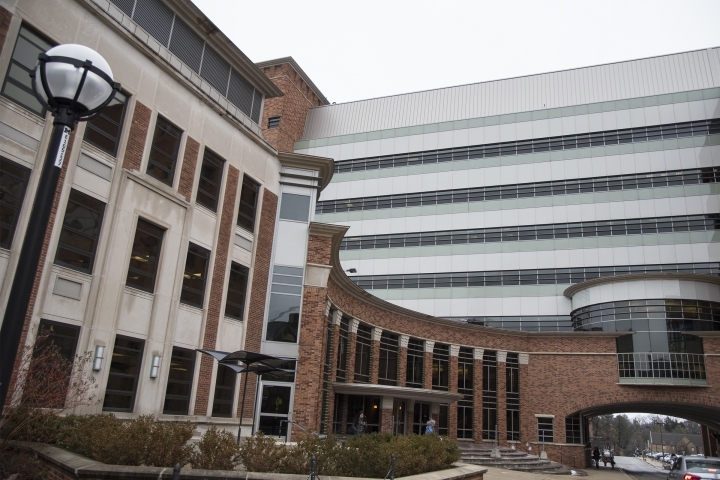
Over 100 attended day one of a symposium on Big Data, Human Health and Statistics, hosted by The School of Public Health Big Data Summer Institute, in the Rackham Amphitheater Thursday.
The event brought together University of Michigan professors and undergraduate students from around the world. Among the schools represented in Thursday’s portion of the symposium were Yale University, Harvard College, McGill University and Johns Hopkins University.
The first half of the event consisted of presentations from University professors.
Sebastian Zoellner, an associate professor of biostatistics and psychiatry, spoke about cutting-edge research in the field of human genetics mapping.
“We try to see in a logistical model how well would our rates predict the occurrence of the human germline mutation in this data,” Zoellner said. “We studied the pattern of inherited mutations in humans by using roughly 250 million extremely rare DNA variants in the human population. Our results will allow us to understand basic processes of the arrival of mutations in humans … This research lays the groundwork for understanding how DNA abnormalities play a role in cancer diseases and aging.”
The event also featured Jenna Wiens, an assistant professor of electrical engineering and computer science whose work involves the intersection of machine learning and healthcare.
Wiens highlighted the often underrated role of machine learning, which is a method of data analysis that allows computers to find insights without being programmed to do so, in promoting the welfare of society.
“Physicians are researching, everyone is analyzing data and still we are ignoring most of it,” Wiens said. “In my work, I use data mining and machine learning to better analyze data and to gain insights on clinical studies that would not be gained otherwise.”
The second half of the event featured poster presentations from undergraduate participants from 29 different universities. Bhramar Mukherjee, a professor of biostatistics, epidemiology and global public health, emphasized the role of the Summer Institute in gathering the nation’s brightest undergraduate researchers at the University, as well as the rigorous process selected researchers must undergo.
“We have been having these six-week summer institute programs for the last three years,” Mukherjee said. “So undergraduate students from all over the U.S. come. This year we have received roughly 250 applications, and we chose 45 students. To come here, students go through an intensive boot-camp in terms of computing, statistical inferences, and in the morning, they have didactic lectures. Faculty from Computer Science, Mathematics and Statistics give (students) lectures on coding, from Python and R, to how to do causal inference, how to do distribute computing, (and) large scale optimization.”
Mukherjee also highlighted the plural nature of research studies conducted through the Big Data Summer Institute, which involves four different interdisciplinary areas of focus. According to her, undergraduate students “are working on cutting edge data.”
“So, we have been growing, the first year in 2015, we had 29 students, then we grew to 46 last year and 45 this year. These projects are actually real big data projects, in terms of imaging, data mining and machine learning, electronic health records (and) genomics,” Mukherjee said. “You will see that … this is very fresh data from the lab, fresh data from the hospital that they are analyzing, (and) this is data that has not been analyzed before.”

